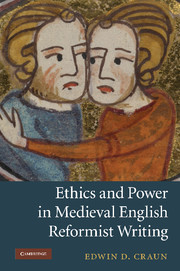Book contents
- Frontmatter
- Contents
- Acknowledgments
- Editorial practices, translations, abbreviations
- Introduction
- 1 Universalizing correction as a moral practice
- 2 Negotiating contrary things
- 3 Managing the rhetoric of reproof: the B-version of Piers Plowman
- 4 John Wyclif: disciplining the English clergy and the Pope
- 5 Wycliffites under oppression: fraternal correction as polemical weapon
- 6 Lancastrian reformist lives: toeing the line while stepping over it
- Postscript
- Notes
- Bibliography
- Index
- CAMBRIDGE STUDIES IN MEDIEVAL LETERATURE
Postscript
Published online by Cambridge University Press: 15 April 2010
- Frontmatter
- Contents
- Acknowledgments
- Editorial practices, translations, abbreviations
- Introduction
- 1 Universalizing correction as a moral practice
- 2 Negotiating contrary things
- 3 Managing the rhetoric of reproof: the B-version of Piers Plowman
- 4 John Wyclif: disciplining the English clergy and the Pope
- 5 Wycliffites under oppression: fraternal correction as polemical weapon
- 6 Lancastrian reformist lives: toeing the line while stepping over it
- Postscript
- Notes
- Bibliography
- Index
- CAMBRIDGE STUDIES IN MEDIEVAL LETERATURE
Summary
Feminist theory has so shaped literary analysis of The Book of Margery Kempe over several decades that it has largely escaped the fate of many medieval narratives since the linguistic turn of the late 1960s: to be read mainly, for some years, in terms of self-reflexive worries about authority, language, and status. By focusing on gender, feminist reading has sharpened our sense of the strategies by which men in the Book consolidate, preserve, and manifest their institutionalized power and of the strategies by which Margery Kempe resists, critiques, and (in more recent readings) negotiates male assertions of power. That is, it has accomplished what Foucauldian analysis of confession does, but more subtly and comprehensively. Women's history, literary and social especially, has informed and enriched these readings by recovering discourses that women employed, among themselves and in conflict with male authorities, like that of the unruly female body (Lochrie), the visionary (Voaden), and the preacher (Gertz-Robinson). As a result, readers have reckoned seriously with the Book's claims for Margery Kempe's exemplarity, its authors' attempts to affect the religious and social practices of medieval women – and men as well. They have considered what the text suggests it can do, the ways it might be practiced by readers and auditors (I echo J. Allan Mitchell's fine introduction to Ethics and Exemplary Narrative in Chaucer and Gower).
- Type
- Chapter
- Information
- Ethics and Power in Medieval English Reformist Writing , pp. 143 - 146Publisher: Cambridge University PressPrint publication year: 2010



